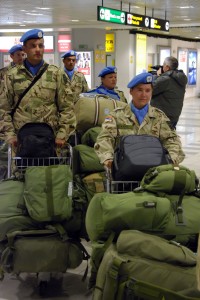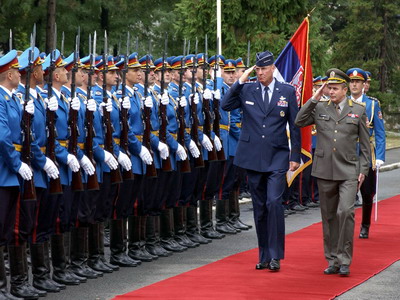Serbia integrated into European peacekeeping operations

(BRUSSELS2) Serbia will be able to participate in crisis management operations, civilian or military, led by the European Union. The 27 authorised, on 20 December, the signing of a framework agreement for the participation of Serbia in the missions of the PeSDC (peacekeeping, security, observation, training, evacuation, etc.).
This agreement is part of a radical rapprochement between the former republic of ex-Yugoslavia and the European Union leading in the long term to membership in good and due form (1). Nothing would thus prevent Serbia from offering its services to make magistrates available to Eulex Kosovo or soldiers in Bosnia. Hypothesis subject to an agreement of the Europeans but theoretically possible now. More likely it could be on the EUNAVFOR Atalanta mission. The Serbian Ministry of Defense very recently indicated that it could take part from 2011 in the European anti-piracy mission in the Indian Ocean.
NB: Serbia already participates in several international UN missions, is a member of the Partnership for Peace and associated with NATO exercises.
Main provisions of the agreement
Commandment. All personnel remain fully under the command of their national authorities. But the national authorities"transfer operational control" to the European Union, for civilian missions; the "operational and tactical control" (OpCon and Tacon), for military operations.
Funding. Serbia assumes all costs related to its participation in the operation, except for running costs, as foreseen by the operational budget of the operation (except for common costs in military operations ). It contributes to the financing of the budget of the civilian (military) crisis management operation led by the EU. Contribution calculated according to the usual distribution keys (ratio of NBI or ratio of employees).
Participation. Serbia has the "same rights and obligations in terms of day-to-day management of the'surgery" than the Member States of the European Union which participate in it.
Responsibility. Serbia undertakes to take responsibility for the compensation of its personnel affected, not to sue or seek compensation from other States participating in the operation, for this fact. Reciprocal provision. It's up to Serbia to "respond to any complaint related to the participation of one of its agents in an EU crisis management operation, whether it emanates from or concerns one of its agents".
Discipline. In a civilian mission, it is the head of the European mission who is responsible for disciplinary matters affecting staff. Any disciplinary measures, however, remain the responsibility of the national authority concerned. In a military operation, it is the "High Military Representative" (Serbian Head of Mission) who is responsible "day-to-day discipline within the Serbian contingente". The EU military operation commander may at any time request the withdrawal of the national contribution after consultation with that country.
We can consider that this is a new step that has been taken for the normalization of relations in the Balkan countries. Croatia, Montenegro and Albania participate or have already participated in EU operations, with or without such a framework agreement. One cannot help noticing all the same that the main military leader during the wars and massacres of Yugoslavia, General Ratko Mladic, is still at large.
(1) Read also:
- Serbian police officers in European police missions?
- 20 years ago, in Yugoslavia, the fire smolders under the ashes
- Serbia in the European concert?
- Tadic-Ashton meeting: Serbia evolves on Kosovo and wins a European stripe
- The EU facilitates the involvement of 20 third countries in defense missions
- Towards a secure information exchange agreement with Serbia

